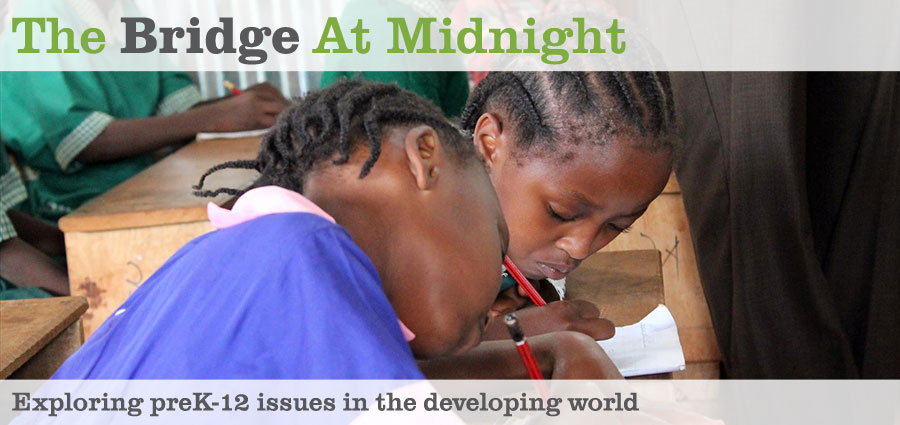Posted: January 11th, 2015 | Author: Michael Goldstein | | No Comments »
Part of our approach to academics at Bridge is to “fail fast.”
The general idea is well-described by Seth Godin, for all enterprises. He writes:
Planning on resilience
That thing you’re launching: what if it fails to function?
The challenge of doing something for a crowd in real time is that if it doesn’t work, you’re busted. Read the rest of this entry »
Posted: January 8th, 2015 | Author: Michael Goldstein | | 2 Comments »

The 2015 Kenyan school year has begun.
This school year will be the first where Bridge has a cohort old enough to sit for the KCPE high-stakes exam in November. That’s the test which determines high school access.
Our team did a big overhaul of curriculum. Early in the school year, we organize a ton of observational visits and talk to a double ton of teachers, try to gauge reaction on “how is this new stuff doing?” As the year goes on, we increasingly use data to answer that question.
Today my colleague Priscilla was observing a first grade lesson. She writes an evaluation and sends it to Annie, who is Read the rest of this entry »
Posted: November 18th, 2014 | Author: Michael Goldstein | | No Comments »
My colleague Priscilla writes:
Aungar and I headed to Rungiri Primary School in Kiambu County (a public school with about 800 pupils). Our job was to see what it’s like for a school to administer a KCPE, Kenya’s high stakes Class 8 exam (8th grade). Bridge will administer the exam in 2015. We were shown around by Teacher James.
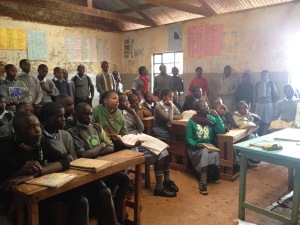
07:00 AM
Arrive at Rungiri with James. About 30 pupils are already there revising (reviewing for the exam). Casual feel. Kids were told to be at school before 7, but roll in Read the rest of this entry »
Posted: November 13th, 2014 | Author: Michael Goldstein | | No Comments »
Noah Yarrow studied 78 high-performing classrooms, and 44 low-performing classrooms. He did this in the Palestinian Territories.
From the World Bank Blog:
We found that teachers of these high-performing classes tend to use more student discussion in the classroom, have a higher proportion of students engaged in learning in a given class period, receive greater support and conduct more outreach to parents.
We also found some differences in how these schools were managed, particularly in terms of school mission and behavior policies and expectations.
None of this is shocking – past studies and even personal experience demonstrate that teachers who keep their students engaged are likely to get better results.
Good stuff. Read the whole thing here. Bonus Lionel Messi reference!
At Bridge, we’ve now just begun some similar work — we’ve built the data system to allow Read the rest of this entry »
Posted: November 12th, 2014 | Author: Michael Goldstein | | No Comments »
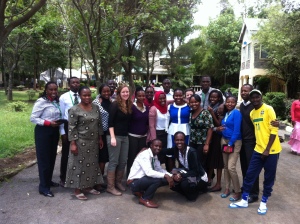
This is our awesome teacher training team, at work in Nakuru.
Question:
When kids are working independently, what should the teacher do? There’s lots of gravitational pull for the teacher to stay at the desk. Nope. Much better to walk the aisles, to “Circulate.”
But what do you do while circulating? It’s tempting to give a mini-lecture or explanation. But that’s not usually the right move. Better to “Praise, Prompt, and Leave.” As Sara writes:
The goal is to train teachers on these very short, highly effective quick prompts that will help pupils do the thinking, help pupils realize the error, help pupils go from wrong to right this time and get it right next time.
We are not training teachers to get better at explaining and re-explaining things to pupils. That is not the goal. However, in order to apply these coaching strategies, teachers will need to be able to quickly and silently, look over a child’s shoulder and quickly figure out what’s going on so that they can provide feedback fast and move on to another pupil.
Posted: October 23rd, 2014 | Author: Michael Goldstein | | No Comments »
The highest-performing charter school network in New York City is Success Academies.
Here is a profile of its founder, Eva, in the New York Times Magazine.
At Bridge, we try to study some of SA’s approach to learning. One key component is massive, massive attention to simply getting kids to do the act of reading. In Africa, that presents a challenge, since the cost of books can be prohibitive to parents who earn < $2/day.
But another component of Success Academies is their shared curriculum (also similar to Bridge). Recently, a teacher in a traditional NYC school wrote about it. I found her take interesting. She writes:
I have taught English at the same school in the city’s public school system for the last six years. I interviewed for a teaching position with Success Academy this summer. While I didn’t accept the offer, seeing the charter network’s approach to curriculum made me think about what it would look like if my school—and others—tried its approach.
At Success, teachers do not spend time crafting the plans and materials for every class—a core expectation of teachers at most schools. When this was first explained, I couldn’t help checking that I’d heard correctly: “So you’re saying teachers don’t lesson plan?” Read the rest of this entry »
Posted: October 16th, 2014 | Author: Michael Goldstein | | 1 Comment »

Hi folks,
Been busy!
Recent article in The Atlantic about Bridge.
Previous attempts to solve this problem have been expensive, and ineffective. According to the same report: “The government spends more than any of its neighbors. There’s a disconnect between Kenya’s spending on education and learning outcomes. More of the same is not enough.”
With public schools in such struggling condition, the country has seen a rise in private schooling over the past decade. Enrollment has grown from 4 percent in 2005 to 12 percent currently. GEMS Cambridge International School, a private schooling company that currently operates in 14 countries worldwide, charges almost $6,500 a year for kindergarten, and that figure grows exponentially as a child moves from grade to grade. In a country where half the population lives on less than a dollar a day, even less-expensive private schools are rarely an option.
This is where Bridge has found its niche: somewhere between the exorbitantly expensive private schools and the absentee-ridden public ones. Read the rest of this entry »
Posted: August 30th, 2014 | Author: Michael Goldstein | | No Comments »
In the USA, perception of Africa is largely unchanged from 5 or 10 years ago. Seen as a basket case. Ebola. Boko Haram. Etc.
There has been progress, though. But economists differ on what is going on. Economist Margaret McMillan (hat tip Neerav):
Some argue that growth across Africa is fundamentally a result of rising commodity prices and that if these prices were to collapse, so too would Africa’s growth rates (Lipton 2012). Others lament Read the rest of this entry »
Posted: August 21st, 2014 | Author: Michael Goldstein | | No Comments »
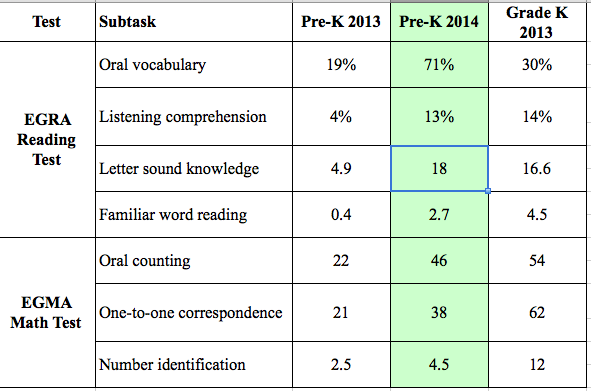
Hi folks,
It’s been a while! Busy. Sorry for not posting much.
If you recall, Bridge made some changes in the 2014 school year to our Nursery curriculum (our 4-year-olds). The changes have been popular with both parents and teachers. But what about the data? Are kids Read the rest of this entry »
Posted: June 2nd, 2014 | Author: Michael Goldstein | | No Comments »
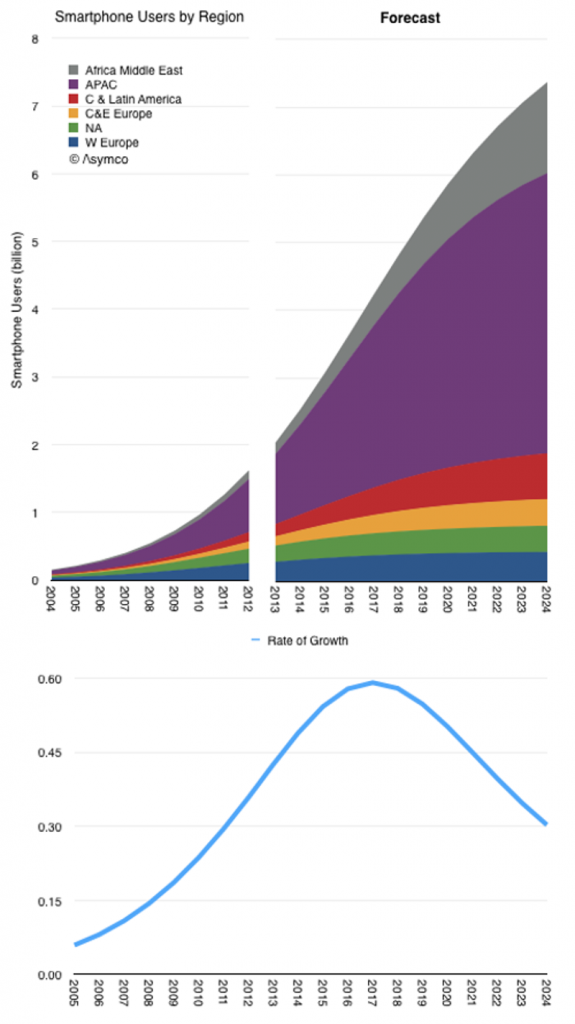
From Forbes:
We decided to understand why modern entrepreneurship was skewed so heavily towards Read the rest of this entry »
